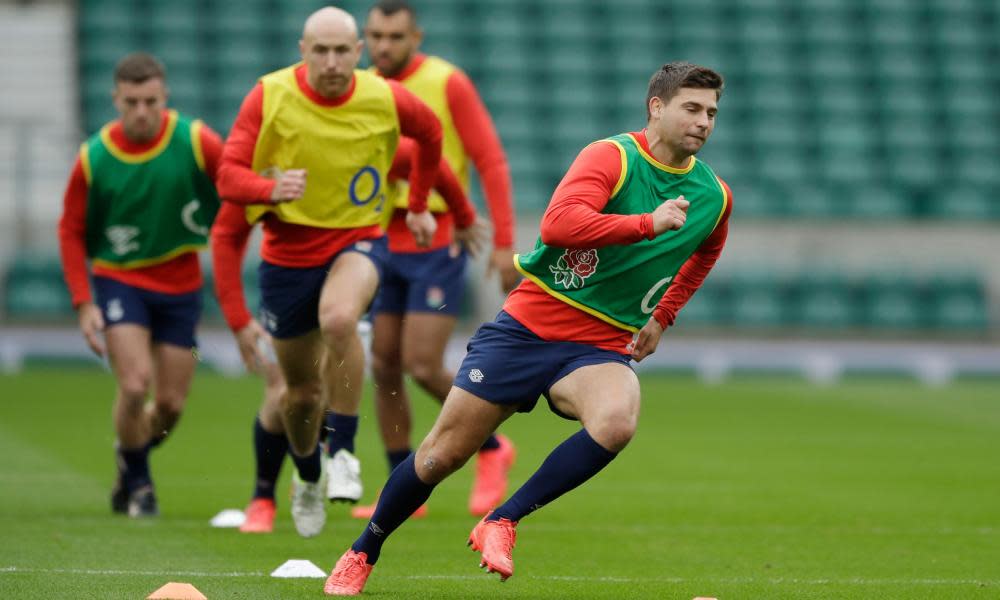Chemistry counts when it comes to Eddie Jones's selection methods

When Andy Farrell named his Ireland squad last week, attention focused not on who had been selected but on the scrum-half, John Cooney, who had been omitted after being on the bench for Ireland’s three Six Nations matches this year.
It was the same when Eddie Jones reshuffled the group of players he had assembled before Sunday’s match against the Barbarians at Twickenham. Rather than the call-up for two young players, Tom de Granville and Ollie Lawrence, the headlines were on Ben Spencer, another scrum-half who had been overlooked.
Related: Daly out with mystery leg injury but Youngs in line for England century
Jones’s policy at scrum-half since he became England’s head coach at the end of 2015 has vexed commentators. Ben Youngs has been involved in 48 Tests, starting 38; Danny Care was picked in 31, starting 10, before being dropped from the squad 10 months before last year’s World Cup. Jack Maunder was on the bench twice on the 2017 tour to Argentina, winning one cap, Spencer and Robson have six caps between them as replacements, Richard Wigglesworth started one and came on in five matches while Willi Heinz, Care’s successor, has 12 caps and four starts.
Youngs will turn 34 just before the 2023 World Cup while Heinz will be 37 a few weeks after it ends, and Jones has yet to settle on a long-term replacement for Youngs. Northampton’s uncapped Alex Mitchell is in the current squad, a 23-year old in his third year at Northampton who has become a regular starter for the first time since lockdown following the departure of Cobus Reinach.
Robson has not been available to train with England because Wasps are facing Exeter in Saturday’s Premiership final at Twickenham. But despite consistently impressive displays at club level, it is unlikely he would have been included, not least because Spencer, a replacement in last year’s World Cup final, has been ahead of him in the selection order and made a difference for Bath when he joined from Saracens in the summer.
Is Jones being perverse, resisting calls that have become louder and louder to include Spencer and Robson for fear of being proved wrong? It was an opinion that developed more after he went out of his way to praise Youngs following the match between Leicester and London Irish in August, an encounter that will not threaten even the long list of the game of the season.
Jones’s job is to produce a winning side, which with two Six Nations titles and a third looming, along with the World Cup final, he largely has done. What he is not bound by, something he said from the start and re-emphasised in his autobiography, is club form. He regards the Premiership as a few notches down from Test level and unreliable as a barometer. When he watches matches, he looks for potential he can develop.
Exeter won the European Champions Cup last Saturday and will expect to follow it up with the Premiership. They exert a grip at forward where a significant number of their tries come from, yet only the hooker Luke Cowan-Dickie is likely to feature for England this autumn, behind Jamie George. Alec Hepburn, Ben Moon, Harry Williams, Don Armand and Sam Simmonds have won their first caps under Jones without becoming regularly involved while the second row Jonny Hill went on the 2018 tour to South Africa.
Does Jones regard Exeter’s pack as greater than the sum of its parts? It is not as if he is against club units: three of the Saracens front five started the World Cup final against South Africa while a fourth, George Kruis, was on the bench; the fifth was a replacement for the Springboks.
“You rely on your gut,” Jones wrote in his autobiography when explaining that, in hindsight, he would have picked a different side to face South Africa in Yokohama. “You never know until the game starts.”
What Jones – as every coach does – acts on is what he sees inside the camp, a no-go area for the media. Selection comes down to more than form. Chemistry, with players sometimes together for as long as a couple of months, counts.
Jones never explains omissions, saying it is something between him and the player concerned. While he is experienced enough not to be deflected by media pressure, what harm is there in revealing what he is looking for?
When the Wales kicking coach, Neil Jenkins, was asked this week about the prospects of the uncapped Bristol outside-half Callum Sheedy featuring this autumn, he talked up the player but noted he would need to adapt to a different style of play, one that would require him to kick more than he did for his club. That did no reputational damage but clarified his thinking.
“You have got to make a call and you look at all sorts of things regarding selection,” said Farrell when asked about Cooney. “Form, attitude, what the last seven months have looked like and what is good for the team. Some people are going to lose out. I hope it galvanises them and they give us a few headaches along the way.”
Selection is the single most important part of a coach’s job and Jones has a strong track record. Some Arsenal supporters are enraged because Mesut Özil has been left out of the club’s squads, a £350,000-a week luxury who will be kicking only his heels. Needs must and a club looking to recover from its lowest league finish for 24 years needs heart more than art. Selection sends a message to all.
• This is an extract from our weekly rugby union email, the Breakdown. To subscribe, just visit this page and follow the instructions.


